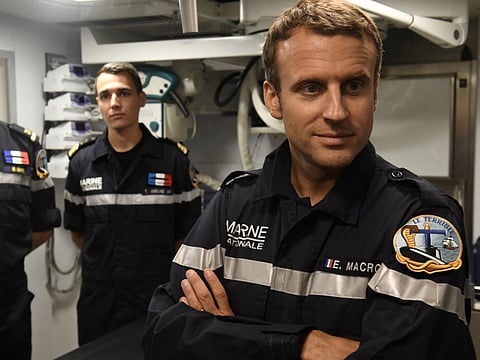Macron seeks reflected glory, but it won’t solve France’s problems
By speaking at Palace of Versailles and praising Charles de Gaulle, the French president is trying to restore dignity to an office beset by challenges

The long lonely walk is becoming something of a trademark for the new French president. First, there was his stately progress through the Louvre to claim his election victory on the evening of May 7. This week, the cameras followed his solemn entry into the Palace of Versailles to address a joint gathering of the two chambers of the French parliament. In the course of his 90-minute speech, which looked and sounded very much like a State of the Union address by an American president, Emmanuel Macron said he intended the speech to become an annual event.
Just as a new US president is showing less respect — some would go so far as to say contempt — for the long-standing conventions of his office, so it seems the new occupant of the Elysee has set out to revive some of the formality, the distance, even the mystique, that attended the French presidency in the past. And of course, not just the presidency. Macron’s summoning of the parliament to Versailles is the second time in his short tenure that he has called the exuberant creation of the Sun King into use as his stage set — the first time was when he hosted Russia’s President Vladimir Putin — and there are those who feel this is taking restoration far too far.
Communist members of parliament and those from the leftist party of Jean-Luc Melenchon expressed their disapproval by boycotting what they saw as the inappropriate Versailles extravaganza. “Pharaonic” and “monarchical” were some of the terms used. Sections of the media were up in arms, with cartoonists having a field day.
However, Macron is not the first French President to have addressed MPs at Versailles. Nicolas Sarkozy and Francois Hollande both spoke there once during their respective presidencies, and Jacques Chirac called a constitutional council there only months after his 1995 election victory, to approve rule changes, rather less ambitions than those proposed this week. Nor is Macron the first to have drawn grumbling from MPs. It is the inconvenience of having to make the trek out to Versailles they object to, as much as any misgivings they may have about the symbolism of meeting amid the palaces of deposed royalty.
With Macron, however, the criticism has been of a different order, though it is hard to pin down exactly why. One cause may be a feeling that it is somehow not fitting for so young a president — at 39 — to place himself in such august surroundings, let alone appear so apparently comfortable there.
Dropping traditional formality
Another might be the generally declining deference of the age. Recent presidents — especially Hollande, but also Sarkozy before him — sometimes made a virtue of descending from the pedestal on which their predecessors had aspired to sit. Whether for reasons of personal temperament or a misplaced sense of modernity, they dropped some of the traditional formality, and lost some of the aura that kept the president apart. That was the direction — until Macron came along.
But the real reason, perhaps, why there has been such hostility to Macron’s use of Versailles may lie in the understanding that it is more than a one-off: That he is not just co-opting the stage set to flatter himself, but is deliberately sending a message about the sort of president he wants to be and the sort of institution he believes the French presidency should be.
The model he has spoken of in the past is Charles de Gaulle — for his aura and for the distance he maintained above the fray. From his Versailles speech — the inaugural speech, it could be said, of his presidency — it was clear that Macron wants to be a De Gaulle-style president.
Not for its own sake, but because he sees the changes he wants to make — and for which he believes he has an electoral mandate — as needing the sort of authority and political will De Gaulle was able to exert.
Reducing the number of MPs by a third, introducing a measure of proportional representation to the electoral process, reforming the labour laws, ending the state of emergency, pruning the bureaucracy in Brussels — these are Herculean tasks that are more than enough for one five-year presidency. The reflected glory of Versailles and the borrowed authority of De Gaulle can give Macron a helping hand. But without more contemporary allies, this president will continue to walk alone.
— Guardian News & Media Ltd
Mary Dejevsky is a writer and broadcaster.
Sign up for the Daily Briefing
Get the latest news and updates straight to your inbox


